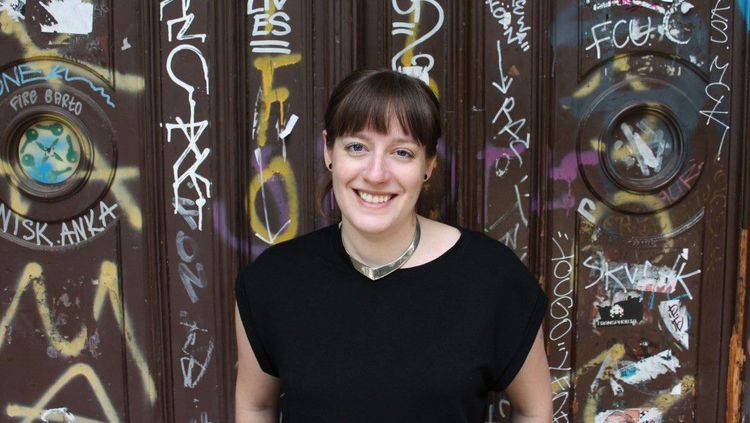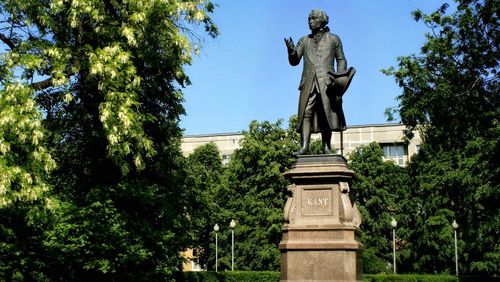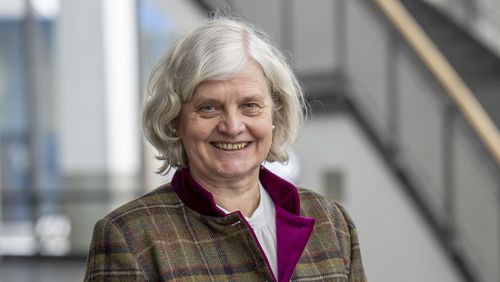Philosopher Hilkje Hänel studies marginalised groups and researches questions related to social justice. The Helene Lange Visiting Professor says her field has some catching-up to do when it comes to equality. A conversation.
Ms Hänel, you are currently the Helene Lange Visiting Professor at the University of Oldenburg's Institute of Philosophy. Are women underrepresented in your field?
Yes, very much so. And this is pretty astonishing, because generally speaking the humanities have quite a high proportion of women. But philosophy is lagging behind here. This is also why I have been working for many years with the Society for Women in Philosophy — one of the two large societies for philosophy in Germany that explicitly address the concerns of women and marginalised groups.
Why does philosophy have such a hard time ensuring that women who qualify in this field stay in it?
First of all, as with mathematics, logic plays a major role in philosophy – and people tend to associate logic/rationality with certain gender roles. At the same time, as with other subject-specific cultures, a vicious circle is at play here: the fewer women there are in higher positions, the fewer will remain in the field – also because there is a lack of role models. In my view, there's some catching-up to do in this respect.
Your research deals with feminist philosophy. Could you tell us more about that?
I study questions related to justice and gender roles. At present I am focusing on "epistemic injustices" — or injustices related to knowledge. These are wrongs done to a person in their capacity as a "knower" and lead to us not being taken seriously. For example, to be able to articulate our experiences we need certain terms to describe them. If the term "sexual harassment in the workplace" didn't exist, women would neither be able to understand what was happening to them, nor could they draw attention to it. But the term "epistemic injustice" also refers to processes in which women or other marginalised persons are assumed to have less knowledge or even to be lacking in skills and knowledge. One example is the idea that women are less rational than men.
What specific aspects do you research?
I focus on the one hand on migration, for example on the experiences of people who are currently going through asylum procedures. How should institutions be organised to ensure that these people don't experience epistemic injustice? I also examine the question of the extent to which residential homes and workshops, for example, are organised on the basis of prejudices against people with disabilities. What assumptions do we make about people, without even bothering to ask them what they think? For example, I wonder what conception of safety we have if we think it is safer for people in assisted living facilities if they cannot lock their door – which means that they have no privacy.
Are these primarily theoretical reflections?
Yes, I'm in the process of constructing the theoretical foundations: Why is it important to acknowledge and consider the knowledge and ideas of marginalised people —to ensure well-functioning democratic institutions, for example? A second step would be to join forces with experts from the political and social sciences in order to make awareness of epistemic injustices relevant to our daily lives in democracy. In philosophy in particular, we like to stay in our ivory towers. I'm also writing a book about epistemic injustices, because so far there is hardly any German-language research or literature on the topic.
Going back to your role as the Helene Lange Visiting Professor: What do you hope to achieve?
We must ask ourselves what we need to offer in philosophy to keep women and other marginalised social groups in this field. In my view, men are more likely to automatically receive recognition when they pursue an academic career. Women, on the other hand, often have to fight for that recognition. Through mentoring, which is part of this visiting professorship, we can offer women support. In Oldenburg, I also hold a colloquium once a month for FLINTA (women, lesbians, intersexual, non-binary, trans and agender people) in philosophy. The idea is to create a free space where these people can display their work, receive recognition and support each other – thus creating a network. I also offer consultation hours for female students and doctoral candidates. In addition, the very fact that I am here, as only the second female professor the institute has ever had, can also serve to inspire others.
Did you have a role model – for example, when you were a student?
No. When I studied English and Philosophy in Göttingen for my bachelor's degree, there were no women professors at all in philosophy – unlike in English Studies. When I finally had a female lecturer, for the first time I really started to believe that as a woman, too, you can stay in academia in philosophy. Another thing that I found difficult was that studying philosophy, with its strong focus on a very male and white canon, offered very few points of reference to my own life and questions. I also hear this from the Oldenburg students. Then I went to England for my master's degree and found a very open department with a feminist orientation. I found that interesting.
What do you think needs to change in philosophy studies?
We need to rethink the field. An introductory seminar on Kant could, for example, concentrate on a feminist critique of the philosopher. We should review the canon and ask why we read certain literature and what underlying institutional mechanisms are at work here. And we should diversify. In the winter semester, for example, I offered a seminar on black feminist philosophy in the master's degree programme. The students loved it – especially the female students — because it's a hot topic that really interests them.
What is your vision for the subject?
My basic vision for philosophy would be that no one is excluded just because they have a marginalised social position. However, this is not about identity politics but about the underlying structures and why certain people are excluded. That, in my view, is an important point for equality.
Interview: Constanze Böttcher




